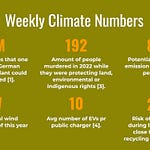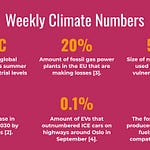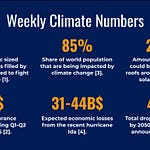Welcome to this weeks edition of The Weekly Climate 🎉
Before we continue I have a quick announcement + an invitation and even an additional unrelated invitation!
First of all: Weekly Climate goes Clubhouse! I have toyed with the idea of using Clubhouse as a way to make sure that we leave no stone left unturned on some of the major news about the climate crisis. And also I wanted to give you my dear subscribers an opportunity to discuss and learn more about the most important news from the past week. And after being increasingly glued to the platform these past weeks I’ve decided that it’s time.
Update: Event is held on Thursday June 3 15:00 CET and not Wednesday June 2 as originally announced due to the fact that we’re thrilled to be able to welcome Betsy Middleton, Strategy and External Communications Manager @ FollowThis — the activist shareholder organisation that played a tremendous role in what happened to the fossil fuel industry this week.
Therefore on Thursday June 3 15:00 CET we’re doing the first Weekly Climate Clubhouse session. So what’s going to happen? There will be two agenda items:
We will discuss one major news items this week. Find it in the newsletter by searching for “#clubhouse”. Hint: It’s got something to do with Big Fossils Bad Week, hence why we got Betsy to join.
I will open the floor to anyone that want to discuss another piece of news. It doesn’t have to be from the newsletter. In fact I would love it if it weren’t. I have to exclude so many things each week that I would love to see what I have missed.
I hope you want to join. As I don’t have a club yet (due to some kind of funny club creation criterias) I host a room from my own profile @reibeldore. So give me a follow and you should see it or simply click this link (or both!). Also if you don’t have Clubhouse yet I’m putting 5 invites up on a first-come-first-served basis. Simply send me an e-mail at michael@weeklyclimate.com with your phonenumber and you will receive an invite and be sure to show up 15:00 CET on Thursday. If I don’t reply on your e-mail it means that you haven’t got the invite. Sorry.
👋 Here’s the link to the Clubhouse event be sure to click the alarm bell in the app or get it in your calendar!
Ok that’s it for Clubhouse. Secondly, you’re all cordially invited to the Demo Day of the other climate project I’m running: Massive.earth. We’re just in the final week of our very early stage acceleration program and we want as many as possible to see the pitches of our 3 best teams as well as couple of cool keynotes. The event is online and held in the afternoon CET so it should be kind of friendly to most timezones. Here’s the link to get a free ticket and learn more.
References: [1], [2], [3], [4], [5] and [6].
‼️News you can’t miss
Here’s one important scary/bad (🙀), good (😻), interesting (😼) and fossil (💩) news item.
🙀 What hermaphroditic frogs can tells us about attacks on “inconvenient” science”.
😻 Big fossils bad day (read on for more details)
😼 Energy Gang interviews Saul Griffith on his plan to electrify America.
💩 The “green energy” that might be ruining the planet. Yes it’s biomass (not quite fossil, but still an important polluter item this week).
👩⚕️ Status: Climate & Science
Let’s look at how we’re doing this week!
[#glaciers] — Greenland’s melting glaciers are polluting coasts around Greenland with a lot of mercury. In fact it’s so bad that the concentrations measured are only worse one other place on the Earth and that’s in the rivers of Industrial China. Mercury is a natural element that are released by things like volcanic eruptions and are passed on from organism to organism and that’s where the mercury concentrations are coming from.
[#heatwave] — Temperatures hit 30C in the Arctic. Last week. In May. That’s 20C warmer than normal for this part of the year. A good thing our world leaders are convening in Iceland to *talk* about climate change...
[#netzero] — If you’re as confused as I am about whether net zero matters then this article adds more that. 3 climate scientists write here a long piece about why netzero is a deceiving trap. Again the key message here appears to be that the net zero is dangerous because it promotes the “pollute now, pay later” mentality of things like offsets, technological salvation and hockeysticks.
📰 The 7 Grand Challenges
⚡️Decarbonize Electricity
Clean electricity is the one do-or-die challenge we must solve.
[#enegystorage] — The Hornsdale battery (also known as the Tesla big battery) in Australia stepped up when a coal plant exploded in Queensland on Tuesday. To protect the grid and reduce the number of customers that had their power cut the battery tested out a feature called “synthetic inertia” in which the battery helps slow down the rate of frequency change on the grid. It’s a crucial grid service that this big battery demonstrated that it is now able to do as well.
[#solar] — New research could potentially boost existing solar cell designs performance by 5-10%. Normally a solar panel has grids in it that are key to harvesting the power at all, but these grids are also deadzones. Light that hits those areas aren’t converted to power. But a new light collector design that can be incorporated into existing designs could direct the light to the active areas of the solar cell.
[#wind] — As an engineer like me floating wind turbines are as close to the hottest thing on Earth you can get and as this article makes it clear why, imagine balancing a bus on a pole and making it float in the ocean. The article dives into GEs efforts to design these things that are as high as the Statue of Liberty and the Washington Monument combined.
🏘 Reduce impact of urban and rural areas
Lowering the impact of urban and rural areas.
[#sewage] — In the UK a recent study determined that the UK is at a big risk for having their rivers polluted by sewage due to climate change. In fact in 2020 UK water companies discharged sewage into rivers more than 400.000 over 3.1M hours.
[#highways] — As cars became a more prevalent means of transportation in the US the highway system was expanded heavily in the 50-60s destroying dense neighborhoods of in particular black people as well as making everybody more dependent on cars. Now some cities in the US are taking back the streets, but not without complications.
[#4dayworkweek] — A new report has looked at what reducing the work week to 4 days would mean for the UKs emissions. The conclusion: A 20% reduction in annual emissions or the equivalent of taking all of UKs cars off the road. Primary drivers of this reduction are lower energy use at people’s place of work, reduced emissions from commuting and finally, more low-carbon activities performed by people.
[#electrification] — 🎧 The Energy Gang podcast discusses Saul Griffiths “war-time” plan for decarbonizing en US electricity grid and electrifying everything. As you know we’re big fans of Saul and if you haven’t heard him talk about his Rewiring America initiative it is hugely inspiring and well worth a listen.
🛁 Clean non-electrifiable activities
Some activities we do today can’t be electrified, these must be cleaned some other way.
[#privatejet] — Flying in a private jet is just about the most emitting action an individual can take. 4 hours of flight time in a private jet pollutes as much as one average European citizen does in a year. Flying in a private jet pollutes 5-14 times per passenger than flying in a commercial jet. A new report suggests to have these wealthy fliers to pay a tax of up to 325M€ every year to fund development in zero emissions aviation.
[#aviation] — The aviation industry is under a lot of pressure. Not only did the pandemic stop airline travel very effectively, but the industry’s carbon emissions are also coming under increasing scrutiny. And they have no solutions right now. This article looks at the state of the aviation industry in terms of solutions from electricity to hydrogen and sustainable aviation fuels and even offsets.
[#airships] — Here’s a look at how airships (think Hindenburg, but without the disaster) can cut emissions from short distance air travel by as much as 90%. The carbon footprint of a passenger on an airship is about 4.5kg compared to 56kg on a conventional jet. It is slower though... It would take 6.5hours to fly from Oslo to Stockholm (which could be completed in an EV in a little more than 7h (according to the ABRP app)) or 4.5h from Seattle to Vancouver (which could be done in ~4h in an EV).
🌳 Protect and grow nature
Nature is our ally, we must protect it and help it help us.
[#investing] — In a new UN report, the organization states clearly that the world need to quadruple our investment in nature to avoid breakdown of ecosystems and thus increasing the level of “ecosystem services” such as clean water, food and flood protection. Quadrupling means investing 0.1% of global GDP in solutions such as regenerative agriculture, forests and pollution management.
[#mangrove] — A new community project in Kenya provides women with loans (250GBP to be paid back over 10 months) and training to help restore Kenya’s vast reserve of mangrove forests. Once the women have paid back the loans they can apply for more to help build even bigger businesses focussing on mangrove restoration.
[#banks] — New research has shown that UK banks supported firms involved in legal and illegal deforestation with 900M GBP in 2020. The study hope to put pressure on new legislation aiming to prevent banks from doing that.
🍽 Optimize food
Without the lower impact of food or drink the hero doesn’t work (modified old danish proverb).
[#australia] — This detailed article looks at what Australian farmers are doing to fight climate change creeping into their lands. It’s a situation where severe frost is not uncommon as well as rains, both destroying crops and making life harder for the farmers. What shocked me in a good way was that the article writes that “like most Australian farmers they have adopted a no-till system” 🤩.
[#foodwaste] — Here’s an article dives into food waste and from the perspective of a number of newer apps that have seen a lot of success in recent days. Among them Danish (and French apparently) Too Good To Go. i was really happy to read that an app like this considers a variety of factors to make sure that the food weren’t going to be donated hereby having the store sell food they would otherwise donate. I think though that it’s missing the crucial question of food waste which is the fact that food waste moves around. If you buy a bagel via Too Good To Go some supermarket might throw one out instead. The article is missing that discussion. Would have loved to learn about this effect.
⚖️ Climate Justice
Without justice there’s no future.
[#australia] — Another climate lawsuit (apart from the one about Shell) this week this time in Australia, where a ruling make it clear that the Australian environment minister has a duty to secure young people and future generations future by acting on the climate crisis.
[#guyana] — The citizens of Guyana have filed a lawsuit against Exxon who wants to expand fossil fuel operations and production off the Guyanese coast. The lawsuit is citing right to a healthy environment as the core argument of the case.
📦 Other / catch-all
All the other stuff that I couldn’t fit into any of the other categories, than the other category.
[#mentalhealth] — A new report looks at the connections between the climate crisis and mental health and determines that we’re not accounting for those at all. Heatwaves are increasing rates of suicide, extreme weather are leaving people traumatized, loss of food security, homes and livelihoods are resulting in stress and depression. Mental health is gravely overlooked when studying climate change. In papers on health and climate change from 2010 to 2020 the authors found mentions of mental health in 1% of them.
[#scienceunderattack] — When science is threatening the bottomline of giant companies thats when the vilest face of capitalism shows. Inside Climate News looks at the case of a scientists who published a lot of papers about how are commonly used weed killer called atrazine is turning male frogs into hermaphrodites and how he was attacked by dark industry powers.
[#pope] — Apparently, the pope means action when it comes to climate change (sort of). In 2015 the Vatican launched the landmark Laudato Si plan to protect the environment and it is now following that up with an action platform that will help bring the Catholic community together around climate action. I think it’s great to see a religious faith being used for things like this.
⭐️Special Topics
🎩 Global and local policy
We have a special interest in covering the major global and local policies regarding climate, whether good or bad.
[#biden] — President Biden’s first pro-fossil fuel decision is making a lot of environmentalists angry (and probably for good reason) as the Biden administration are allowing a drilling project in Alaska to carry on. The anger by the environmentalists is being followed up with a lawsuit.
[#eu] — This is another great example of how much lobby organizations control our policies today: And yes it’s related to the big new EU taxonomy that aims to define what can be considered a “sustainable investment”. The two biggest points of debate whether gas and nuclear can be considered sustainable investments. Germany wants nuclear out, but gas in. Which makes no sense whatsoever. I don’t understand why this is even a debate.
[#california] — California was ravaged by wildfires last year and the year before that... and so on. And now the state is increasing the wildfire prevention spending by 16 times this year compared to last year. Severe drought has hit the state with normal river flows at 2% the level that is normal for this year. The Heated newsletter also had a detailed issue out last week on the wildfire problem on the west coast.
[#crime] — Brazil’s environment minister is being investigated for an illegal logging cover up. Basically the minister is being investigated for covering up criminal deforestation activities. Apparently, the guy is known for derailing climate negotiations already.
⛽️Major Carbon Emitters
We have a special interest in covering the moving of the major carbon emitters as these are the key roadblock to climate action.
[#bigfossilsbadweek, #clubhouse] — The biggest news item(s) by far last week was big fossils very bad week and consequently and amazing day for all life on Earth. We will spend a bit more space than usual on these three items. Here’s what’s happened:
Exxon: A hedgefund called Engine No 1 who owns just 0.02% of Exxon shares managed to get two very climate positive board members elected. Hopefully these two members will be able to put a lot of climate positive pressure on Exxon.
Chevron: 61% of Chevron’s shareholders voted against the board of directors wishes and now wants Chevron to reduce their scope 3 emissions (i.e. the burning of their products) something that looks very hard to do unless they abandon fossil fuels.
Shell: Shell lost a landmark case put forth by Dutch NGOs which forces Shell to reduce emissions by 45% over the next 9 years.
There was a lot of news items about these. Here are a few notable ones: Grist gives an overview, New York Times about Exxon, The Guardian on Chevron and Exxon, DeSmog on Shell.
🙏 Thank you so much to all the great folks at FollowThis (Chevron (& Shell last week)), Engine No 1 (Exxon) and Friends of the Earth Netherlands (Shell). You are the true heroes of the week! But also if you want to know more be sure to join us on Clubhouse on Thursday 3pm CET (update: Changed, see note at the top of the newsletter).
Ok, moving on:
[#coalcountry] — Many countries and states around the world are heavily dependent on the fossil fuel infrastructure to provide a livelihood. In the future without the fossil fuel industry these people need to be taken care of. And one such plan is to turn these industries from mining coal for instance to mining for rare earth minerals whose demand are expected to increase a lot. This article look at the heart of coal country in the US: Wyoming. A new podcasts series called 🎧 Carbon Valley is looking at Wyoming from the other angle: A gigantic market for carbon capture projects.
[#biomass] — A great and detailed article about why biomass really isn’t the climate solution that EU politicians claim it to be through logic that appear to be as close to fantasy as one can get (according to the article). First, you cut down a tree, then you put it on a boat, ship it across the Atlantic, burning bunker fuel all the way, then you light it on fire in a European country and by pure magic all the CO2 that usually is emitted from burning some how disappears! What do you know! The biomass industry is a 50B$ industry and here in the EU we like it so much that we’re using it way more than wind and solar.
[#banks] — A new report by WWF shows that UK banks helped finance the production of 805Mt of CO2 emissions every year, which is almost 2x that of UKs annual carbon footprint. The finance sector in the UK is therefore one of the biggest UK contributors to the climate crisis and if it were a country it would rank as the 9th highest emitter in the world.
That’s it for this week folks! Remember if you’re feeling down, angry or sad from some of the news in this newsletter one cure is to act. And one way you can always act that also happens to be one of the most powerful things you can do is to talk about it. That also works if what you just read made you hopeful or happy btw.
If you enjoyed this newsletter don’t forget to share it with your friends, coworkers or other people you think could benefit from getting it. If you got directed here by a friend or another link on the Internet don’t forget to subscribe!
Remember to join our first Clubhouse session on Wednesday June 2nd 15:00 CET.
See you all next week 👋












